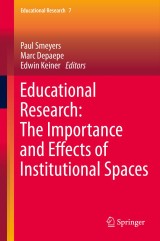Details

Educational Research: The Importance and Effects of Institutional Spaces
Educational Research, Band 7
|
96,29 € |
|
| Verlag: | Springer |
| Format: | |
| Veröffentl.: | 05.04.2013 |
| ISBN/EAN: | 9789400762473 |
| Sprache: | englisch |
| Anzahl Seiten: | 221 |
Dieses eBook enthält ein Wasserzeichen.
Beschreibungen
<p>This collection of fresh analyses aims to map the links between educational theory and research, and the geographical and physical spaces in which teaching is practiced and discussed. The authors combine historical and philosophical perspectives in examining the differing institutional loci of education research, and also assess the potential and the limitations of each. The contributors trace the effects of ‘space’ on educational practice in the classroom, in the broader institutions, and in the academic discipline of education—doing so for a range of international contexts. </p><p>The chapters address various topics relating to the physical and geographical environment. How, for example, does geographical space shape researchers’ mental frameworks? How did the learning environments in which young children are taught today evolve? To what extent did parochialism shape America’s higher education system? How can our understanding of classroom practice be enhanced by concepts of space? The book acknowledges that texts themselves, as well as the research ‘arena’, are ‘spaces’ too, and notes the fascinating debate on the concept of space in the field of mathematics education. Indeed, as more and more students move online, the book analyses the rising importance of virtual spaces such as Web 2.0, which have major educational implications for researchers and students joining the innovative ‘virtual’ universities of the future.</p><p>This publication, as well as the ones that are mentioned in the preliminary pages of this work, were realized by the Research Community (FWO Vlaanderen / Research Foundation Flanders, Belgium) Philosophy and History of the Discipline of Education: Faces and Spaces of Educational Research.</p>
<p>1. Exploring a multitude of spaces in education and educational research.- 2. American democracy and Harold D. Lasswell: Institutional spaces of ‘failure’ and ‘success’, present and past.- 3. The power of the parochial in shaping the American system of Higher Education.- 4. Crossing the Atlantic to gain knowledge in the field of psycho-pedagogy: The 1922 mission of Ovide Decroly and Raymond Buyse to the USA and the travel diary of the latter.- 5. The emergence of institutional educational spaces for young children: In pursuit of more controllability of education and development as part of the long-term growth of educational space in history.- 6. A different training, a different practice. Infant care in Belgium in the interwar years in the city and in the countryside.- 7. Disability, rehabilitation & the Great War: Making space for silence in the History of Education.- 8. Interpretation: The space of text.- 9. Exploring educational research as a multi-layered discursive space.-10. The spaces of mathematics: Dynamic encounters between local and universal.- 11. The classroom space: A problem or a mystery?- 12. Spaces and places in the virtual university.- 13. Material contexts and creation of meaning in virtual places: Web 2.0 as a space of educational research. 14. From entrepreneurialism to innovation: Research, critique, and the Innovation Union.- 15. About the Authors.- Index. </p>
<p>This collection of fresh analyses aims to map the links between educational theory and research, and the geographical and physical spaces in which teaching is practiced and discussed. The authors combine historical and philosophical perspectives in examining the differing institutional loci of education research, and also assess the potential and the limitations of each. The contributors trace the effects of ‘space’ on educational practice in the classroom, in the broader institutions, and in the academic discipline of education—doing so for a range of international contexts. </p><p>The chapters address various topics relating to the physical and geographical environment. How, for example, does geographical space shape researchers’ mental frameworks? How did the learning environments in which young children are taught today evolve? To what extent did parochialism shape America’s higher education system? How can our understanding of classroom practice be enhanced by concepts of space? The book acknowledges that texts themselves, as well as the research ‘arena’, are ‘spaces’ too, and notes the fascinating debate on the concept of space in the field of mathematics education. Indeed, as more and more students move online, the book analyses the rising importance of virtual spaces such as Web 2.0, which have major educational implications for researchers and students joining the innovative ‘virtual’ universities of the future.</p><p>This publication, as well as the ones that are mentioned in the preliminary pages of this work, were realized by the Research Community (FWO Vlaanderen / Research Foundation Flanders, Belgium) Philosophy and History of the Discipline of Education: Faces and Spaces of Educational Research.</p>
A major contribution to the debate on institutional context in education research Challenges received notions in the applied philosophy and history of education Examines novel concepts of educational space such as online learning in Web 2.0
Diese Produkte könnten Sie auch interessieren:

Community Schools in Africa

von: Deborah Glassman, Chloe O'Gara, Kristin Helmore, Jordan Naidoo, Fred Wood

53,49 €















